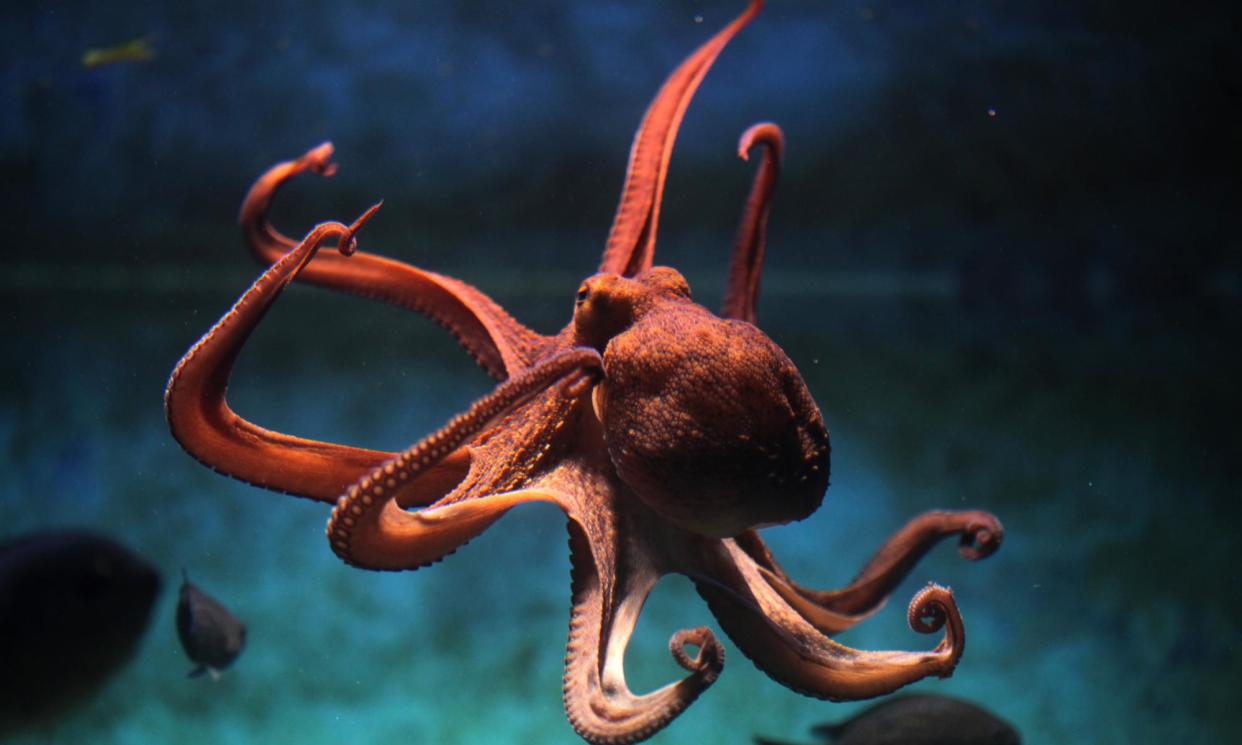‘The finger-touch sent shivers down my spine’: my encounter with a common octopus

If I could relive any wildlife encounter, it would be the time last summer when I played peekaboo with an octopus. Usually, when I find myself in the rare company of an underwater celebrity, such as a beautiful, eight-armed cephalopod, only a few fleeting moments pass before I unintentionally scare it away. But this octopus wasn’t going anywhere.
I was floating in knee-high water, heading back to shore after a long free-dive off the coast of Brittany, when I saw the octopus right in front of me. It was a common octopus (Octopus vulgaris), a species that has recently been showing up in large numbers along north-east Atlantic coasts. Octopus booms have happened before, most likely linked to warm currents bringing streams of paralarvae, the mini-octopuses that drift for a time before settling on to the seabed. In 1899, fishers in Cornwall and Devon moaned about a plague of octopuses climbing into their crab pots and munching all the bait. In the last few years, octopuses off Brittany have been doing the same thing.
The one I saw was the size of a small pet cat and it wasn’t in a trap; it was just sitting among seaweedy rocks, its skin dark and mottled and raised into bumps, a devil horn above each eye. It moved a short way and turned its body smooth and pale, fine red lines matching the veins of the bare rocks. Octopuses are masters of disguise.
I sensed the octopus was comfortable in my presence. It was obviously watching me back with those expressive eyes, so I decided to have a go at re-creating a moment from the Netflix documentary My Octopus Teacher. I reached out a hand, and almost instantly the octopus obligingly unfurled an arm and investigated my fingers, the thin tip like a wriggling worm.
That finger-touch sent shivers down my spine. I had seen octopuses before, including a curled octopus (Eledone cirrhosa) in Strangford Lough, Northern Ireland, but had never made contact with one. And it was more than a physical connection. This was the first time a wild animal – free to go at any time – had hung around, paid me attention and wondered what I was.
Not to cast aspersions on the other invertebrates, but octopuses are undoubtedly the smartest of them all. Their nervous systems are more complex than any other spineless species, a sophisticated arrangement of half a billion nerve cells. When kept in captivity, octopuses need constant stimulation and puzzles to solve; they find ingenious ways to escape and raid nearby aquarium tanks for food before covering their tracks and acting as if nothing happened; they are adept at using tools, like coconut shells, to hide inside, and when they fall asleep it looks as if their dreams are scribbled on their skin in colourful, changing patterns. They leave us humans trying to imagine what it feels like to be an octopus, conscious of their own existence.
I don’t know what the octopus was thinking as we shook hands, but my next move gave me a tangible glimpse inside its mind. As I ducked behind a rock and deliberately slipped out of its line of sight, the octopus reared up with its pliable body and stretched its eyes as tall as they would go. Surely it had one thought: Where did you go?
Helen Scales is a marine biologist and writer
Welcome to the Guardian’s invertebrate of the year competition! Every day between April 2-12 we’ll be profiling one of the incredible invertebrates that live in and around the UK. Let us know which invertebrates you think we should be including here. And at midnight on Friday 12 April, voting will open to decide which is our favourite invertebrate. The winner will be announced on Monday 15 April.


